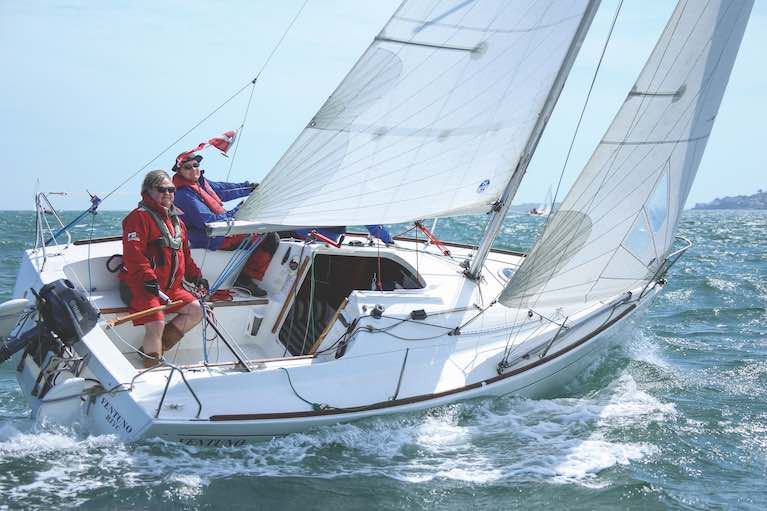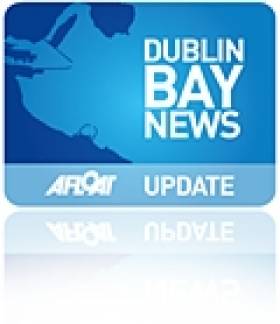Displaying items by tag: Beneteau 21
Beneteau 21s Have Been a Real Racing Success Story on Dublin Bay
The Beneteau 21 Class Championships 2020 sailed on Dublin Bay despite the odds over two Saturdays in September writes the class Honorary Treasurer, Jimmy Fischer
21ft boats are no stranger to Dublin Bay, indeed we are seeing a rise of the original under the expert eye of Hal Sisk, but it is another 21ft racing class that has made its mark on the bay. The Dublin Bay fleet of Beneteau 21s has been one of the real racing success stories of the past few years.
These 21ft racer cruisers were the smallest sailing boats made by Beneteau at the time of their launch in the early 1990s. A few model upgrades later and the boats started making a regular appearance on DBSC start lines in 2006/2007, getting their own DBSC start in 2012 and recognition as a one design class at Dun Laoghaire week since 2013.
 Nip and tuck in Beneteau 21 class racing on Dublin Bay
Nip and tuck in Beneteau 21 class racing on Dublin Bay
 Beneteau 211 racing on Dublin Bay where there is a 12-strong racing fleet based out of Dun Laoghaire Marina Photo: Afloat
Beneteau 211 racing on Dublin Bay where there is a 12-strong racing fleet based out of Dun Laoghaire Marina Photo: Afloat
Today, they have a 12 strong racing fleet, many of whom are originals from the 2006/2007 start line. These are supplemented by entries from Malahide and Greystones for Regattas, Regional and National events. It really shows the commitment of this fleet that 10 of them were regularly racing even in summer 2020.
And that commitment did not waiver when it came to fighting it out for their National Championships, which the fleet managed to fit in despite the ever-changing sailing calendar and restrictions.
 A Beneteau 21 with a racing crew of four Photo: Afloat
A Beneteau 21 with a racing crew of four Photo: Afloat
10 boats fought it out in a National Championships which they combined with the National Yacht Clubs 150th Anniversary Regatta. 4 races split over 2 Saturdays (one of which all bar one boat had to retire from due to a course mix up!) and the B21's had their 2020 national Champions.
- Small Wonder on 7 points
- Billy whizz on 8 points
- Chinook on 9 points
- Ventuno on 10 points.
As always in this class, it was tight at the top. Few fleets push each other quite as hard as the B21s where it is not uncommon for the series to end with just a point in it.
 Racing under spinnaker in a B21
Racing under spinnaker in a B21
Hopefully, 2021 will bring back a more conventional racing calendar and apres sail for these small but fierce boats, along with recognition as a class by the ISA, which is currently pending.
Read also: ....And Now it's the new Dublin Bay 21
#beneteau21 – The Beneteau 21 (B21) class association, which caters for owners of Beneteau 210, 211 and 21.7 boats is hosting an open day in Dun Laoghaire on June 7th. The new 'Dublin Bay 21' class featured in Winkie Nixon's sailing blog on Afloat.ie last season.
The B21 is emerging as a strong one design class where the racing is friendly and the ownership costs are low. The boast are versatile, being a good compromise between racing and weekend cruising.
The objectives of the open day are twofold. The first is to give people with a little sailing experience a chance to race on the Beneteau 21 and they might then become regular crew on one of the boats. The second is to give prospective owners and owners who don't currently race the opportunity to try out racing in a low pressure environment.
The format for the day is:
Meet 09:45 at the Dun Laoghaire Marina.
10:00 Briefing
10:30 Introductory sail on a Beneteau 21.
12:00 Raft up for lunch in the Royal St George Yacht Club
13:00 Leave to compete in the afternoon DBSC race (weather permitting)
17:00 Debriefing and a pint!
There is no charge for the day, however we are asking people to register by texting your name and email address to 087 1228665.































































